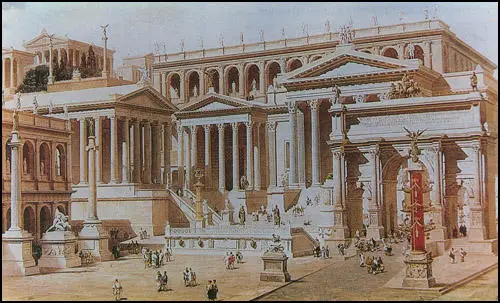Republican Government
The period of rule under the Etruscan kings had made the Roman people distrustful of a system where one person made all the important decisions. After the formation of the Republic in the 6th century BC they devised a new system of government. Power in Rome was now in the hands of a small group of rich families. The male heads of these families were called patriarchs. Three hundred of these patriarchs met in a place known as the Senate where they discussed government matters.
Every year the senators nominated two men to become joint leaders of Rome. These men were called consuls. The senators could advise but it was the consuls who made the decisions. The consuls controlled government spending, foreign relations and the appointment of military commanders and provincial governors. In an effort to prevent foolish decisions being made, the two consuls had to be in agreement before decisions were taken.
Although the senators nominated them, the consuls were elected by the Public Assembly. In theory all Roman male citizens could attend the Public Assembly held in the Forum but it was organised in such a way that it was usually the patricians who controlled the decisions that were made. Sallust argued: "The Romans... introduced a new system in which authority was divided between two annually elected rulers; the limitation of their power, it was thought, would prevent them being tempted to abuse it."
The Roman citizens who were not members of the ruling families were called plebeians. For hundreds of years the plebeians were not allowed to marry members of the patrician families so the two groups were kept very separate. The plebeians were in the vast majority but they were not free to elect who they wanted. This was because of a system called clientela. Every patriarch would have a large group of plebeians who were his clients. In exchange for financial and legal support, the plebeians supported the wishes of their patriarch. This included the way he voted in the Public Assembly.

The wealth of Rome created conflict between the patrician ruling class and the plebeians. The patriarchs owned large farms while a considerable number of plebeians were landless. Many plebeians got into debt. If, after a period of time, they could not pay back their debts, the plebeians could be sold into slavery.
In 494 BC the plebeians, inspired by what they had heard about democracy from the Greeks, had a meeting where they swore an oath of mutual support. They then informed the Senate that if it did not agree to their demands, they would form their own community outside Rome. As the plebeians provided labour for the fields and made up most of the army during warfare, the Senate was forced to accept their demands.
It was agreed that the plebeians could each year elect two men to represent their interests. These men, who became known as tribunes, had the power to protect plebeians against the actions of the patriarchs. Tribunes were not paid and so they were nearly always fairly wealthy people.
Following another campaign the Senate agreed that plebeians could also become consuls and praetors (officials who helped to govern Rome).
Primary and Secondary Sources
(1) Graffiti found on the walls of Pompeii (c. AD 79)
The fruit dealers urge the election of Marcus Holconius Priscus.
I ask you to elect Gaius Julius Polybius aedile. He gets good bread.
I wonder, O wall, that you have not fallen in ruins from supporting the stupidities of so many scribblers.
(2) Sallust, The Conspiracy of Catiline (c. 40 BC)
Kings are more suspicious of good men than of bad, and always fear men of merit... the Romans... introduced a new system in which authority was divided between two annually elected rulers; the limitation of their power, it was thought, would prevent them being tempted to abuse it.
(3) Livy, The Early History of Rome (c. 25 BC)
The Roman people were not living under a monarchy but were free. They had resolved to throw their gates open to enemies rather than have kings.
Questions:
1. Read sources 2 and 3. Select examples from these sources where the author expresses (i) a fact, and (ii) an opinion.
2. Why, according to Sallust, did the Romans elect two consuls every year?
3. Describe the important change that took place in Roman government in 494 BC.
4. What do the sources on this page tell us about Roman elections?
5. Look up the meaning of the following words: censors, census, citizenship, clientela, consuls, dictator, magistrates, patrician, populares, senate, tribunes and veto. With the help of a dictionary explain how these Latin words have influenced the English language.
